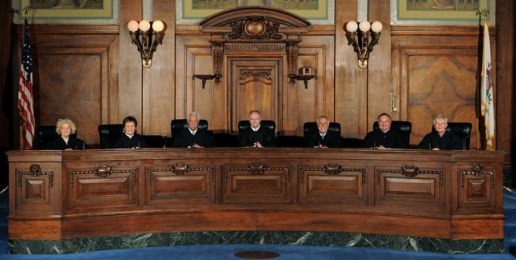
Today the Illinois Supreme Court ruled unanimously that the Illinois Parental Notice of Abortion Act of 1995 is constitutional and, therefore, must take effect.
Finally, after almost 18 years of legal obstacles thrown in the path of this reasonable law by the ACLU, parents (or guardians) of minor girls will finally be accorded their right to know that their daughter is planning to undergo a significant medical procedure attendant to which are serious physical and emotional risks.
This law is not a parental permission law. It merely requires that parents or guardians be notified at least 48 hours prior to an unemancipated minor girl acquiring an abortion. Actually, the law is so generous that it permits the person notified to be a parent, grandparent, step-parent or guardian who is living in the home with the minor girl.
Further, it provides for a judicial bypass waiver that would allow exemptions from notification for medical emergencies or to protect girls who come from abusive home environments whose safety might be jeopardized by parental notification.
But neither parents’ rights, nor minors’ health is sufficient to override the ACLU’s obsession with absolute, unfettered sexual liberty.
Justice Anne Burke wrote:
While it is unquestionably true that minors, like adults, possess constitutional rights, including the right to an abortion, the rights of minors are not coextensive with the rights of an adult….This disparate treatment is “grounded in the recognition that, during the formative years of childhood and adolescence, minors often lack the experience, perspective, and judgment to recognize and avoid choices that could be detrimental to them.” In addition, when considering the constitutionality of a parental notification statute, the minor’s rights are not the only rights to be protected—parents have a constitutional right to raise their children and “the guiding role of parents in the upbringing of their children justifies limitations on the freedoms of minors.”
While the ACLU presents scenarios in which the bypass procedure is ineffective or girls suffer as a consequence of notifying parents, it ignores the real potential for long-term emotional consequences that many women suffer for decades following abortion, including increased risk for drug and alcohol abuse, depression and suicidal ideation.
The ACLU makes the absurd claim that since a girl has the right to choose to carry a baby to term, she should have the right to choose to abort it. The ACLU strains to compare choosing to do nothing (i.e. allowing a pregnancy to continue) to choosing to undergo a surgical intervention. The only point of correspondence between those two options is the issue of “choice.”
There are two additional flaws in this argument. First, the notification law does not abrogate a minor girl’s right to choose an abortion. It merely requires parental notification.
The ACLU then argues that the mere fact of notification serves as a coercive obstacle to absolute unfettered choice. In so doing, the second problem with the ACLU’s reasoning becomes clearer. The ACLU ignores the fact that when parents, most of whom love their daughters deeply, remain ignorant, the dominant coercive force often becomes the boys or men who impregnated these girls. While the ACLU frets paternalistically that parents may compel daughters to carry an unwanted baby to term, it has little concern about a fourteen-year-old girl being compelled by her fifteen-year-old boyfriend to abort their baby.
Once notified, some parents may try to persuade their daughters not to have an abortion, but how is that more onerous than allowing teenage boys or older victimizers—who are much more likely to have self-serving motives—to be the central persuasive force?
The choice to allow a baby to live or die will never be absolutely free. The questions are who has the right to help young girls make that choice and whose input is most valuable.
The ACLU’s opposition to parental notification is wildly inconsistent with the requirements for parental notification and permission for virtually any other elective invasive medical procedure from ear-piercing to tattooing to cosmetic surgery. Moreover, when an invasive medical procedure involves not merely serious health risks but the voluntary destruction of the life of another human being, young girls need and deserve the input of those who love them most.
Click HERE to support the work & ministry of IFI.






















